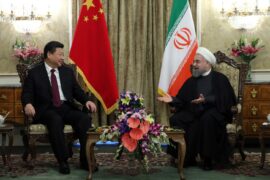Member of Knesset Naftali Bennett (Yamina) is expected to announce Sunday night that he intends to form a government together with the Yesh Atid, Labor, Meretz, Blue & White, New Hope and Yisrael Beiteinu factions.
The expected coalition – dubbed a “change government” as it aims to oust Prime Minister Binyamin Netanyahu (Likud) from office – would total only 57 lawmakers and fall four Knesset mandates short of the 61 seat majority needed to form a coalition. Bennett and Lapid reportedly plan to rely on external support from Mansour Abbas’s four seat United Arab List in exchange for a committee to better address the needs of Israel’s Palestinian citizens.
If such a coalition is formed, Bennett would serve as prime minister for two years and then be replaced by Yair Lapid (Yesh Atid) for the next two.
Yamina voters have expressed outrage at Naftali Bennett’s ostensible defection from the national camp, feeling betrayed that their votes would go towards the establishment of a Liberal Zionist government and bring factions into the coalition who support increased westernization and partitioning the country into two separate states.
Yamina lawmaker Amiḥai Chikli resigned in early May as an act of protest against Bennett seeking to establish an anti-Netanyahu “change government” with the Liberal Zionist parties, leaving Yamina with only six mandates to contribute to such a coalition.
“A government over which black flags fly,” Chikli tweeted on Saturday night, using a Hebrew expression for matters that could have ominous consequences or that, in Israeli military jargon, should not be allowed to happen.
According to Channel 12 News, Bennett has given Yamina number two Ayelet Shaked until 10pm Sunday night to convince S’ar to agree to Netanyahu’s deal and establish a nationalist coalition. If Shaked proves unsuccessful, Bennnett will agree to form a government with Lapid.
To better understand Naftali Bennett’s behavior, it’s important to understand Israel’s political system from the back end.
Since entering the Knesset after the 2012 elections as head of the sectoral Bayit Yehudi faction, Bennett had strategized to build himself first as political leader of the national-religious camp and then expand beyond that base to head a mainstream party that could realistically lead the nation. But his estrangement from the national-religious camp on social and ideological issues, as well as the transparent nature of his political aspirations, earned him distrust from much of the public he was meant to represent.
That, combined with his impatience at the pace of his own political progress, caused him to prematurely attempt the jump from leading a sectoral party to leading a mainstream one.
In December of 2018, just before the first of the current series of national elections, Bennett and Shaked announced that they were splitting from the Bayit Yehudi in order to form their own party. But that party failed to garner the necessary 3.25% of votes in the April 2019 elections to make it back into Knesset. It was only the political destabilization caused by Netanyahu’s inability to form a coalition and resulted in a second round of elections that saved Bennett’s career. But he appeared to have learned the dangers of breaking away from the national-religious sector without a strong political base of his own.
Bennett returned to his former partners in Bayit Yehudi and National Union but when his brief yet impressive stint at defense minister portrayed him as a potential national leader and polls started giving him close to 20 seats in the summer of 2020, he again sought to make the political leap from head of a sectoral faction to candidate for leading the state. But this time he attempted to maintain enough affiliation with the national-religious sector to attract its more affluent and westernized voters.
Gideon S’ar’s defection from Likud split the anti-Netanyahu nationalist vote in the fourth round of elections, and Bennett managed to win only seven seats by successfully retaining support from the national-religious sector’s more bourgeois communities. But Naftali Bennett understands that the best way to transcend that base and become a viable candidate to lead the nation is to be perceived by the Israeli public as a credible contender for prime minister.
Bennett’s willingness to form a coalition with the Liberal Zionists is really just about catapulting himself to being seen as a prime ministerial candidate in the eyes of the broader public. He clearly didn’t intend to get stuck as head of a small sectoral party for as long as he did yet he now understands the dangers of trying to break away from the national-religious sector before having a large enough loyal base of his own to vote him in each election.
The only way forward for Naftali Bennett is to become prime minister now by any means necessary and to do an impressive job. If successful, this would mean that from now on he would be able to focus exclusively on political fights to become or remain head of state and not have to waste time or energy on fights to simply get into Knesset – fights he clearly sees as beneath him (being perceived as a prime ministerial candidate generally comes with enough of a political base to get in).
After betraying the desires and expectations of the national-religious public, Bennett is gambling on becoming prime minister and performing so well in the role that even those who feel betrayed by this current phase of his plan will forgive him just as they’ve learned to forgive Netanyahu for his betrayals (even the national-religious Israelis who don’t vote for Netanyahu fully expect their sectoral party to sit in government under him). But if Bennett fails to become prime minister and remains merely the head of a small party that betrayed its voters, his political career is likely finished.
Naftali Bennett has already crossed the point of no return with his gamble. If he has the stomach to see the plan through, it can work. But that means his best option is to form a “change government” rather than a nationalist one. Bennett’s entire plan rests on him reaching the prime minister’s office. So even though going with Netanyahu (assuming S’ar could be convinced) would allow him to act as if his attempted betrayal was merely a bargaining strategy, the fact that Lapid is offering him first round in a rotation deal while Netanyahu is only offering him third place – something that would depend on a coalition lasting more than three years – opting for Lapid’s offer better ensures Bennett’s survival.
Some have argued that even as prime minister in such a government, Bennett wouldn’t be able to effectively govern while tied down by Liberal Zionist coalition partners. But most of those Liberal Zionists are politicians, not ideologues. Due to the rapidly shrinking voter base often fought over by the Labor and Meretz factions, both parties rarely get the chance to see the inside of a government.
It’s also important to keep in mind that, according to reports, it looks as if most of the ministries Labor and Meretz would receive in the “change government” would enable them to show their voters they can produce results without getting in Bennett’s way. Even if a coalition crisis were to prevent Bennett from serving as prime minister for the full two years, he would still likely manage to survive in office long enough to achieve his goal of accustoming the broader Israeli public to see him in the role. In the meantime, he would also be seen as a unifier and could continue to deliver nationalist rhetoric while blaming coalition partners for tying his hands or forcing him to submit to American pressure.
While forming a nationalist coalition under Prime Minister Netanyahu appears to be what’s best for the State of Israel under the current circumstances, what’s best for Naftali Bennett’s personal political career is to become prime minister as soon as possible in a rotation deal with Lapid and to perform so well in the role that voters forget how he obtained it.






Thank you, Lavi, for an insightful analysis of the Bennett gambit that even this American could understand.